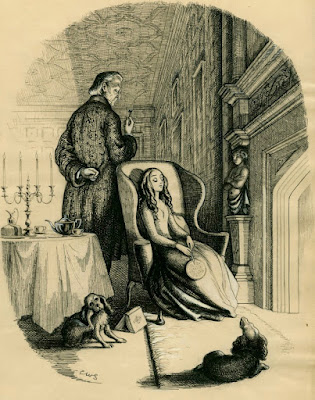. Mi-conte, mi-roman historique, ce livre se base sur la vie du célèbre chef, Antonin Carême et sa relation avec l'énigmatique Talleyrand.
C'est merveilleux pour moi de voir cette histoire - qui d'ailleurs est bien Française, même si elle a été originalement conçue en anglais - prendre une toute nouvelle forme. Petit à petit, je découvre mes personnages pour la première fois, comme si le fait de leur rendre leur langue maternelle leur redonnait vie.
L'un de mes personnages préférés, c'est Boucher, le maitre d'hôtel de Talleyrand. Dans ce passage, qui est l'un de mes préférés, Antonin qui a seize ans rencontre Boucher pour la première fois.
Un après-midi, alors que je me dirigeais chez M. Rose, Avice vint me trouver en disant :
« Antonin, l’un de nos clients les plus estimés voudrait te voir. Il est dehors, près de la diligence. Tu dois aller lui parler tout de suite.
— Maintenant ?
— Oui, oui, dit Avice. Ne lui fais pas attendre. Il représente notre client le plus important. »
Je me précipitai hors de Bailly, encore revêtu de mon tablier. Je vis un homme dans la quarantaine avec un visage rond et doux et une perruque poudrée. Je le reconnus pour l’avoir aperçu à plusieurs reprises auparavant, commandant des gâteaux pour des banquets ministériels.
C'était la première fois que j’avais l’occasion d’examiner ses vêtements de près. Sa chemise de lin était d’un tissage exquis, et une cravate blanche épousait son cou avec élégance. Avice n'avait pas menti; l'homme portait des chaussures à boucles et une longue veste mauve satinée. Il sentait la lavande et avait un air soigné comme je n'en avais jamais vu, même parmi les bourgeois qui accourraient régulièrement chez Bailly.
« Monsieur Carême, me dit-il en s'approchant. Vous êtes bien le jeune homme qui livre des pâtisseries au Palais Royal ?
— Oui. Oui, c'est moi. » J'essuyai mes mains sur mon tablier, l'air un peu déplacé. Je n'avais pas la moindre idée qui était cet homme ou ce qu’il voulait. Il semblait revenir d'une autre époque. Les gens portaient-ils encore ces culottes et ces bas de soie ?
« Monsieur Avice me dit que vous vous dirigez vers vos cours de pâtisserie.
— Oui monsieur, c'est sur rue Grange-Batelière.
— Je marcherai avec vous », répondit l'étranger d’une voix aimable.
Ses paroles s’écoulaient agréablement comme s'il fréquentait des nobles ou en était lui-même un des leurs. Mille questions me traversaient la tête en remontant la rue Vivienne.
« J'aime votre travail, monsieur Carême. Il me semble prometteur.
— Merci monsieur ... monsieur ... »
Il avait fait preuve d'un tel effacement, malgré son rang, qu'il ne s'était même pas encore présenté.
« Boucheseiche, répondit-il. Vos pâtisseries – elles sont beaucoup plus légères que dans de nombreux établissements parisiens. Je l'ai tout de suite remarqué. Je dirais que ce sont parmi les meilleurs auxquelles j’ai goûté. Certaines améliorations pourraient être adoptées, certes, mais pour la plupart, je suis très impressionné. Est-ce que vous savez qui je suis ?
— Non, monsieur Boucheseiche.
— Il fut un temps où je dirigeais les cuisines de Louis Joseph de Bourbon, prince de Condé. Oh, c'était il y a des années, bien avant les événements du 14 juillet. Beaucoup de choses ont changé depuis. Le prince ne réside plus dans son château à Chantilly. Il est à présent en Angleterre. Mais pour avoir servi la maison Condé, je suis en quelque sorte le successeur de Vatel. »
Il avait parlé doucement et sans emphase, mais je restais stupéfait par ses paroles, et mon enthousiasme eut raison de moi.
« François Vatel ! J'ai lu beaucoup de choses au sujet de ce maître d'hôtel ! Il a servi Nicolas Foucquet ! C’était un grand chef qui inventa la crème Chantilly. »
Le regard de M. Boucheseiche tomba sur moi. Il semblait m’évaluer et prit un air grave pour un instant. Je retrouvai aussitôt mon calme :
« Je veux dire heu... c'est tellement... intéressant, monsieur Boucheseiche.
— Appelez-moi Boucher. Monsieur Carême, vous vous trompez. Vatel n'a jamais inventé la crème Chantilly.
— Ah bon ? » Je me sentis rougir.
« Mais non. Pas du tout. »
Boucheseiche sourit à son tour. Un silence incommode suivit alors qu'il m'examinait. À quoi pensait-il ? Je devais avoir l'air d'un idiot.
Il sortit de sa longue réflexion. Ses yeux bleus se posèrent tendrement sur moi :
« Un jour, murmura-t-il, je vous révèlerais peut-être le secret de Chantilly. »
Et avant que je puisse me remettre de cette étrange remarque, Boucheseiche prononça ces mots magiques :
« Seriez-vous intéressé à travailler pour moi, monsieur Carême ? Je supervise des banquets pour une personne d’une haute importance. Le monde que je vous propose de rejoindre est plus grand que tout ce que vous connaissez. Mais… qu’y a-t-il ? Vous ne vous sentez pas bien ? »
Je m’étais arrêté de marcher. Je ne pouvais plus respirer. Je regardais Boucheseiche comme s'il était une vision de rêve.
« Pardonnez-moi, monsieur Boucheseiche.
— Boucher, rappela-t-il.
— Pardonnez-moi, monsieur Boucher. C’est que… je sens que cela ne peut pas m’arriver à moi. C'est presque… presque comme dans les contes de fées. »
Il me contempla en silence avant de dire :
« N'est-ce pas ? » Il reprit de plus belle, « La révolution, monsieur Carême ! Nous vivons à une époque qui évolue si vite. Vous étiez garçon de courses il y a quelques années… Et maintenant ! Maintenant, vous êtes sur rue Vivienne, et on vous mande de venir travailler avec Boucheseiche venu droit de la grande Maison Condé. Oui, vous avez bien raison. C'est semblable un conte de fées. »
Son visage prit alors un aspect mélancolique.
« Et pourtant, souvent, ajouta-t-il sa voix teintée de regret, même les plus beaux contes de fées connaissent une fin tragique. Monsieur Carême, j'étais autrefois à l’emploi d’une princesse qui possédait tout, tout ce que son cœur désirait, et ce qui lui arriva, je prie le ciel, ne frappera jamais même les plus vilains laquais. »
Il se redressa avec autre sourire généreux.
« C'est peut-être un peu trop pour vous aujourd'hui. Je vous laisse réfléchir à mon offre. Je reviendrai un autre jour pour vous parler d'éventuelles conditions d'emploi. Il y a beaucoup à faire et cela va prendre du temps. Nous ne nous presserons pas. Après tout, l'homme que j’ai l’honneur de servir aime bien prendre son temps. Au revoir, monsieur Carême. »
Toujours le soufflé coupé, je regardai le mystérieux Boucher rejoindre sa calèche, alors qu’il me laissait dans tous mes états devant le seuil de chez M. Rose. Mon cœur n'avait jamais battu aussi vite. Je transpirais d’émotion, et pour le reste de l’après-midi, tous mes efforts pour me concentrer sur les leçons de massepain de M. Rose furent en vain.
J’appris le nom de la princesse à laquelle Boucher avait fait allusion. La malheureuse princesse de Lamballe avait été mutilée par une foule violente pendant l'une des périodes les plus sombres de la révolution. Elle qui avait été mariée à l'homme le plus riche de France, du jour au lendemain, sa fortune avait basculé.
C'était ce que Boucher avait essayé de dire. Que la révolution avait tout changé. Tous les tournants du destin étaient possibles.
Pourtant, je n’arrivais toujours pas à comprendre. Comment un garçon de cuisine sorti d’une gargote, près de la barrière du Maine pourrait-il travailler avec un homme comme Boucher qui avait jadis connu une princesse ? Comment pourrait-il être instruit par ce maître d'hôtel qui avait autrefois servi la maison Condé ?
L’arrivée subite de Boucheseiche dans ma vie était comme un rêve devenu réalité. Il apparut devant chez Bailly quand je m'y attendais le moins. Sa première visite fut brève, mais elle me bouleversa pendant des mois. Après avoir livré son message, il disparut aussi soudainement.
Je ne le reverrais que l'année suivante quand il me conseilla de changer de boutique et de travailler avec Gendron. De cette façon, expliqua-t-il, je détiendrai plus de temps libre et je deviendrai pâtissier libéral.
Un pâtissier libéral ! Moi ? Les idées tourbillonnaient dans ma tête à la perspective de cette nouvelle profession.
De nombreux contes de fées ont une marraine dotée de pouvoirs magiques. Cendrillon en avait une. La Belle au Bois Dormant en avait plusieurs. Ces personnes apparaissent quand on s’y attend le moins, agitant leur baguette pour faire des tours de magie. Elles allègent les douleurs et offrent un nouveau lendemain. Elles créent quelque chose à partir d’un rien et vous laissent avec un sentiment d'incrédulité.
Comment cela pouvait-il m'arriver ? L’avais-je mérité ?
Après un peu plus d'un an chez Monsieur Bailly, Boucheseiche était devenu mon parrain. Mon conte serait aussi merveilleux que n'importe quel autre.










































